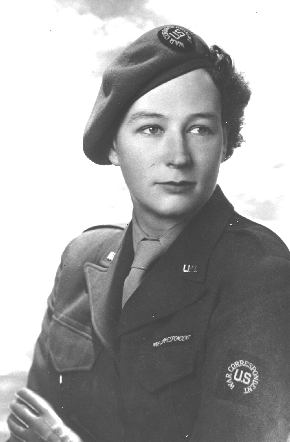Page 51
[Begin Tape 1, Side A]
Kasper: Well, good morning. Let's pick up with some bombs and—
Kirkpatrick: Well one of the early activities, when the Germans became active in the air over Britain, was going down to Dover. The first trip that I see I had notes of was going down with Virginia Cowles, an American who lived and worked in London and wrote for British papers, and (Jimmy) Vincent Sheehan and David Bruce, who was there for the American Red Cross, and who later became—
Kasper: An ambassador, didn't he?
Kirkpatrick: He later became an ambassador. We drove down to Dover and, according to my notes, I don't recall it, but we spent several days there. It became quite a thing to do. Various correspondents would go down to Dover for the day and sit on the cliff and watch the German planes come in and the RAF fighters go up and the air battles went on. We sat on Shakespeare Cliff and watched this.
One notable time was when the Chicago Tribune correspondent was down there. He was a strange man who, in Chicago, had had an interest in a boomerang factory. So he was accustomed to walking across Shakespeare Cliff throwing a boomerang, you see. It was fine until the danger of an invasion became such that the British mined the cliff. There was a walk along the edge of it and we were all down by the walk, maybe four or five of us, and we looked up and there was Guy Murchie coming across this mine field with a boomerang. We were terrified. We were afraid if we called out to him, it would cause him to jump or fall on a mine, and we stood there paralyzed while he made his way safely through and came down the edge and said, "Oh, hi, folks. What's the matter?" [Laughter.]
And another time, later than that, he was staying at this little hotel—it was sort of our headquarters—and he was sitting on the edge of his bed putting his shoes on when a German artillery shell sliced the hotel in half, leaving him sitting on the bed and a great gap in front of him—totally undamaged. Again, I think he sat there with his mouth open and said, "Oh, what happened?" It was interesting. [Laughter.]
Another time in those early days, I remember driving down to—
Kasper: This was in 1940, was it?
Kirkpatrick: It was 1940, yes. The early days of when the Germans were really coming over testing the strength of the RAF. They hadn't really started saturation night bombing, but they had begun bombing, but much more military objectives. I drove down with David Bruce and Ben Robertson, a marvelous man from Clemson, South Carolina, who worked for the newspaper P.M. Ben was killed in the crash of the Pan Am plane at Lisbon the following year—a wonderful man. When the three of us drove down to Plymouth, we were greeted by Lady Astor and Lord Astor in the square. They were dedicating a memorial to something—what, I've forgotten. But at any rate, Plymouth had been severely bombed because Dartmouth, the big naval base, was right there at Plymouth. So we went around and inspected all of that. That night there was an air raid and there were bombs that fell fairly close, including one that blew a car up onto the top of the Astors' house. We were all, by that time, downstairs in the basement and the house was shaking—either from the car landing or from the bombs.
Nancy Astor was very amusing. She was a very sharp-witted and sharp-tongued person, but she could also be very humorous and extremely kind except to her political opponents. She used a rapier-like wit on them. Churchill is alleged to have said to her one day, "If I were married to you, I would put poison in your coffee." And she said, "And if I were married to you, I'd drink it." [Laughter.] That kind of exchange went on. But she was quite a character. She and Ben had

